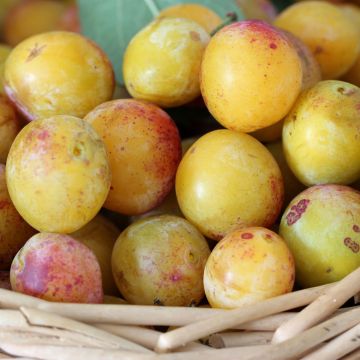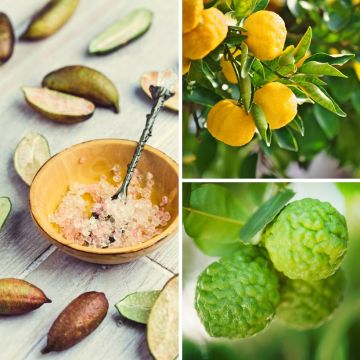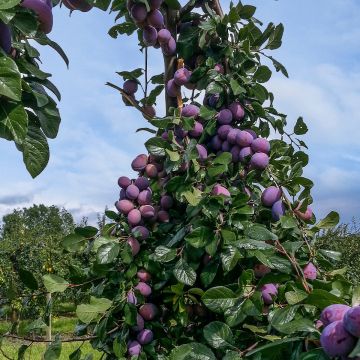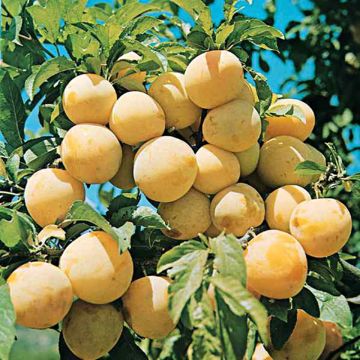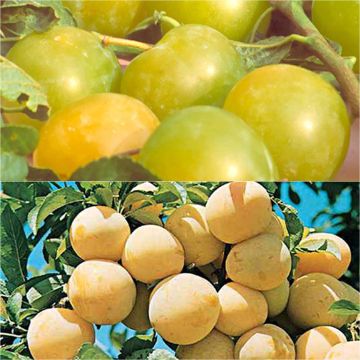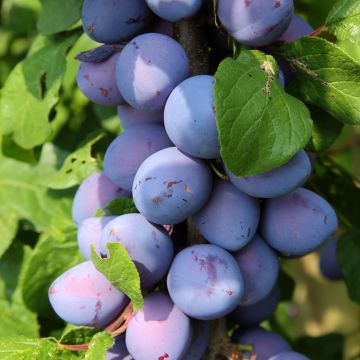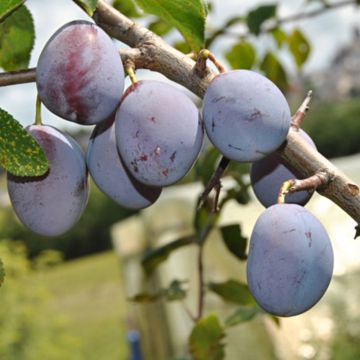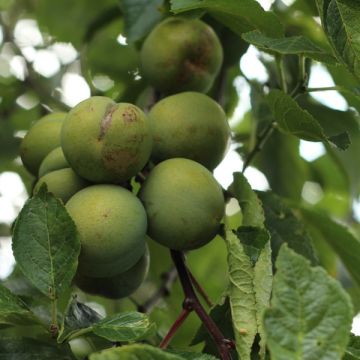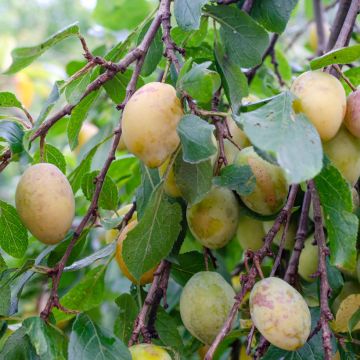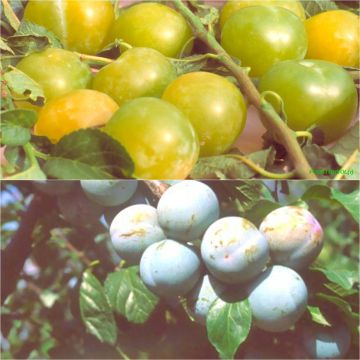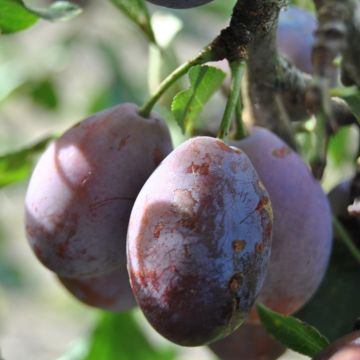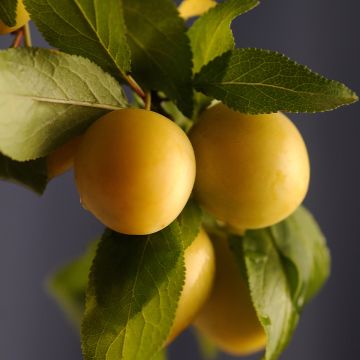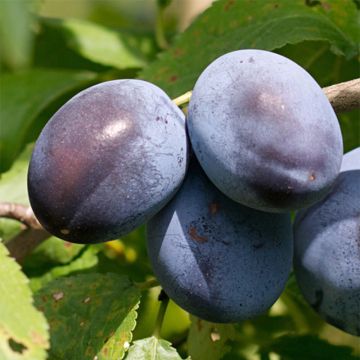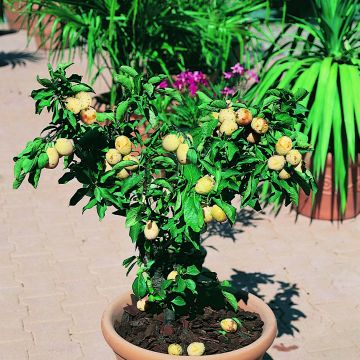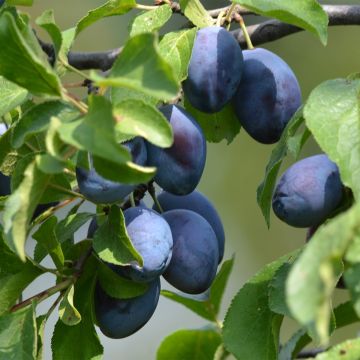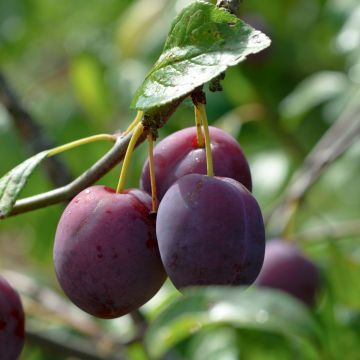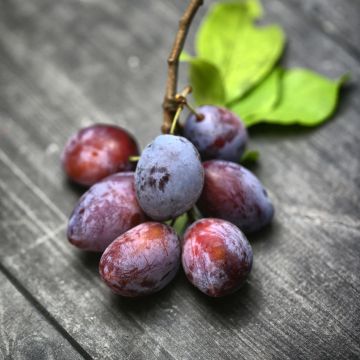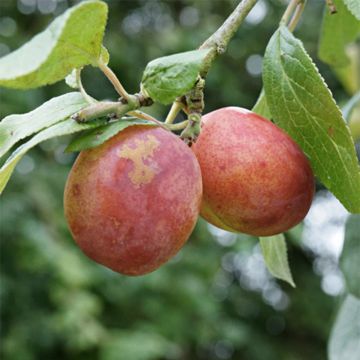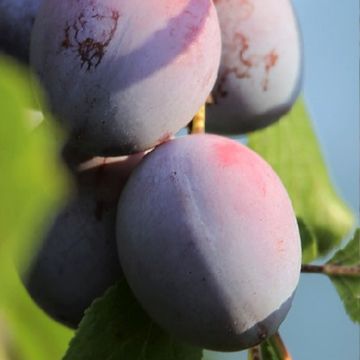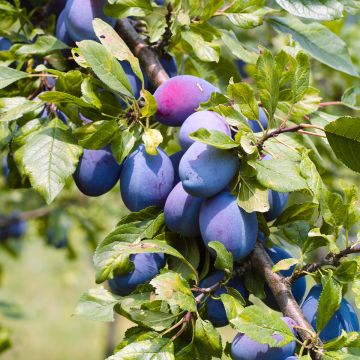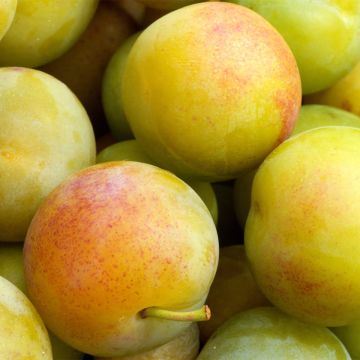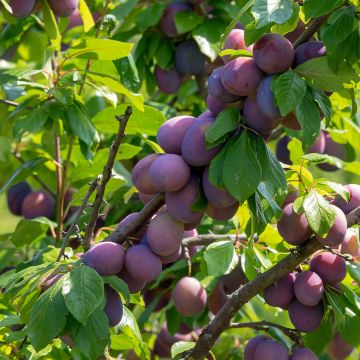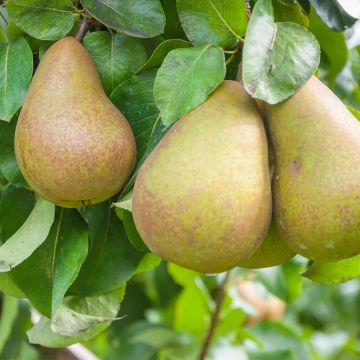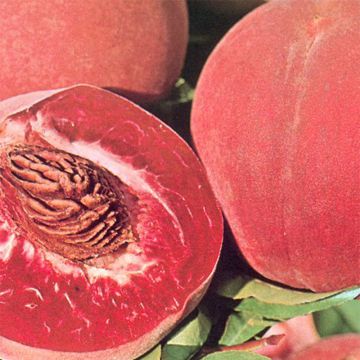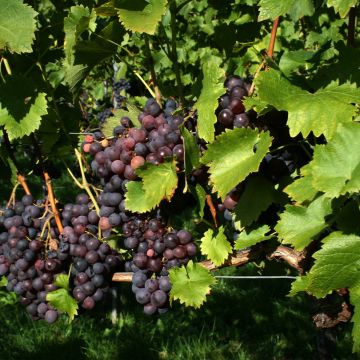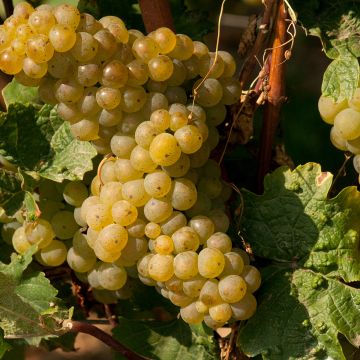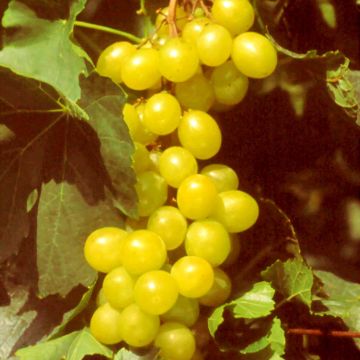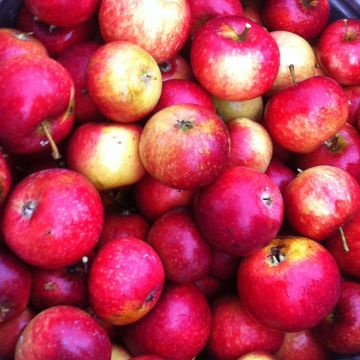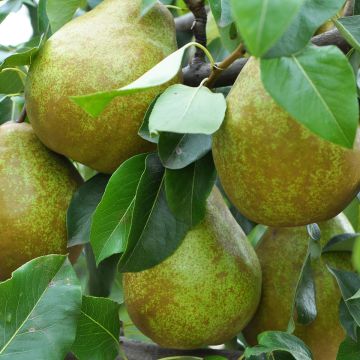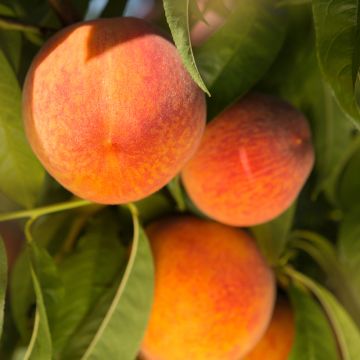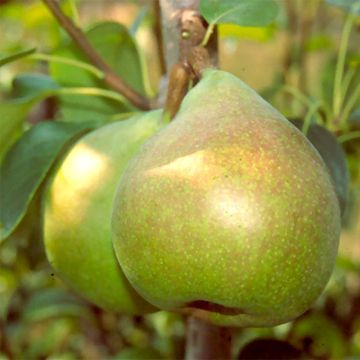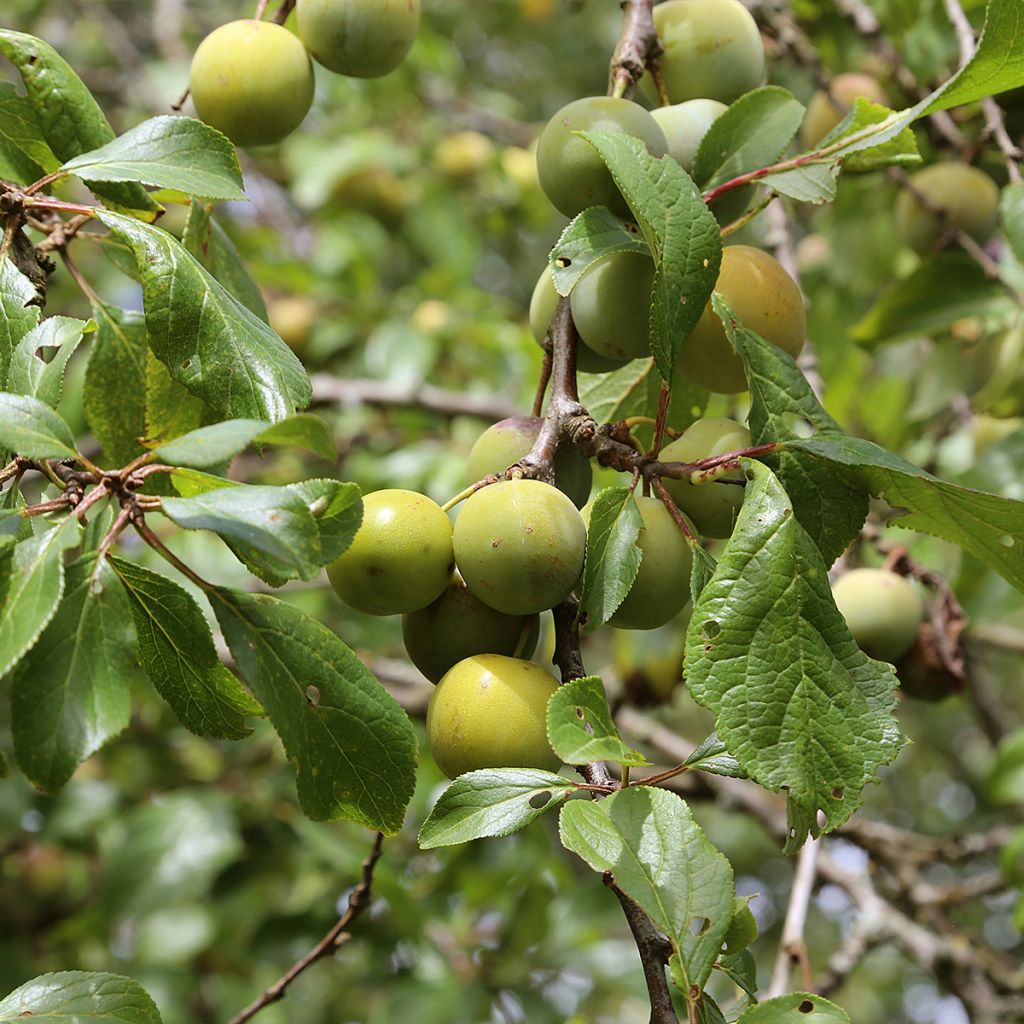

Prunus domestica Reine Claude Moissac - Common plum
Prunus domestica Reine Claude Moissac - Common plum
Prunus domestica Reine Claude Moissac
European plum, Common plum, Garden plum
Why not try an alternative variety in stock?
View all →This plant carries a 6 months recovery warranty
More information
We guarantee the quality of our plants for a full growing cycle, and will replace at our expense any plant that fails to recover under normal climatic and planting conditions.
Oversize package: home delivery by special carrier from €6.90 per order..
Express home delivery from €8.90.
Delivery to Corse prohibited: UE law prohibits the import of this plant from mainland France to Corse as part of the fight against Xylella fastidiosa. Please accept our sincere apologies.
More information

Description
Prunus domestica Reine Claude (de) Moissac is an old self-fertile and early variety of Plum tree. It forms a small bush with vigorous growth and an upright habit. Its flowering occurs in March-April with white flowers that attract bees. They develop into round, green-yellow plums during the summer ripening from early August. Their flesh is both sweet and tangy, and these fruits can be eaten fresh or used for making jams. This very hardy Plum tree should be grown in full sun in well-drained ordinary soil.
Plum trees belong to the vast Rosaceae family, which includes most of our temperate climate fruit trees (Apple trees, Pear trees, Apricot trees, Peach trees, Cherry trees, Quince trees...) as well as small fruits (Blackberries, Raspberries, Strawberries). The Prunus genus itself is extremely large, with over 300 species, including both fruit-bearing (Almond trees, Peach trees...) and ornamental varieties such as many trees (Japanese Cherry trees, Flowering Apple trees...) and shrubs like the widely spread Prunus laurocerasus, or Cherry Laurel. Prunus domestica is probably native to Asia Minor (Syria) and would have been introduced to Rome, along with many other species, following the Roman conquests. According to some authors, its introduction to Europe might be more related to the Crusades, who really knows?
The "Reine Claude" form a group within the Plum trees, including many varieties such as Reine Claude d'Oullins, Reine-Claude Bavay, Reine Claude Dorée, Reine-Claude d'Althan, Reine-Claude de Chambourcy, Reine-Claude Diaphane, and others. A very old variety, Reine Claude Moissac is a productive variety from Lot-et-Garonne, locally selected from the population of Reine Claude Dorée (cultivated since at least the 16th century). Earlier and more branching than its relative, this variety is vigorous and has an upright habit, forming a small tree 4 to 5m (13 to 16ft) high and 3 to 4m (10 to 13ft) wide. Reine Claude Moissac is self-fertile and therefore does not require pollination by another Plum tree. In March-April, simple white flowers with 5 petals and nectar are produced in corymbs. Once pollinated, the flowers develop into plums during the summer. They have a fairly round shape, medium to large size, and are green-yellow, with a slight blush on the sunny side. They ripen very early - early August - and their green flesh is firm, juicy, and sweet, with a slightly tangy taste. These fruits can be eaten fresh as soon as they are harvested and can also be used in pies or jams and transformed into eau-de-vie. Plums are refreshing fruits and relatively low in calories, rich in vitamins E (a powerful antioxidant beneficial to our cells) and B9 (involved in amino acid metabolism and helps reduce fatigue).
This variety is hardy down to around -20°C and thrives in full sun, in well-drained, neutral to slightly alkaline, preferably moist soil. It is an easy-to-grow tree, resistant to diseases, and not very demanding once well established.
This moderately growing Plum tree will find a place in most gardens. To enjoy fruit throughout the season, plant it alongside other species such as Captivator Gooseberry bush, which will offer its tangy berries in July. Apple trees will bear fruit after this Reine Claude, in September and October, as will Pear trees. And to extend the season into November, nothing beats the Solissimo Kiwi with its vitamin C-rich fruits, or a Chinese Persimmon like the Muscat variety with its decorative and succulent orange fruits.
Report an error about the product description
Prunus domestica Reine Claude Moissac - Common plum in pictures
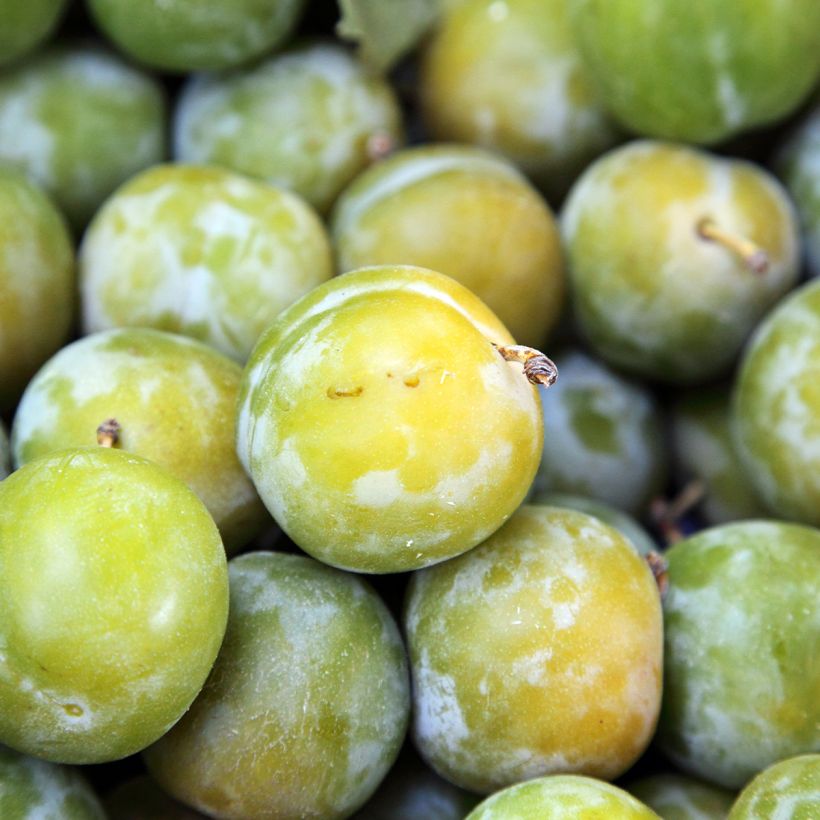

Plant habit
Fruit
Flowering
Foliage
Botanical data
Prunus
domestica
Reine Claude Moissac
Rosaceae
European plum, Common plum, Garden plum
Cultivar or hybrid
Other Plum Trees
Planting and care
This Prunus 'Reine Claude Moissac' prefers deep clay-limestone soil, moist or at least not too dry. However, it can adapt to other types of soil, but it is quite demanding in terms of sunlight. It is hardy to about -20°C (-4°F) and adapts to most climates.
Dig a planting hole of at least 50 cm (20in) on all sides and even more, this tree likes deep soils. It also appreciates some humidity, so make sure to water it regularly in summer and autumn during the first few years. Once well-rooted, it is a hardy and undemanding tree.
Planting period
Intended location
Care
-
, onOrder confirmed
Reply from on Promesse de fleurs
Ancient and local varieties
Haven't found what you were looking for?
Hardiness is the lowest winter temperature a plant can endure without suffering serious damage or even dying. However, hardiness is affected by location (a sheltered area, such as a patio), protection (winter cover) and soil type (hardiness is improved by well-drained soil).

Photo Sharing Terms & Conditions
In order to encourage gardeners to interact and share their experiences, Promesse de fleurs offers various media enabling content to be uploaded onto its Site - in particular via the ‘Photo sharing’ module.
The User agrees to refrain from:
- Posting any content that is illegal, prejudicial, insulting, racist, inciteful to hatred, revisionist, contrary to public decency, that infringes on privacy or on the privacy rights of third parties, in particular the publicity rights of persons and goods, intellectual property rights, or the right to privacy.
- Submitting content on behalf of a third party;
- Impersonate the identity of a third party and/or publish any personal information about a third party;
In general, the User undertakes to refrain from any unethical behaviour.
All Content (in particular text, comments, files, images, photos, videos, creative works, etc.), which may be subject to property or intellectual property rights, image or other private rights, shall remain the property of the User, subject to the limited rights granted by the terms of the licence granted by Promesse de fleurs as stated below. Users are at liberty to publish or not to publish such Content on the Site, notably via the ‘Photo Sharing’ facility, and accept that this Content shall be made public and freely accessible, notably on the Internet.
Users further acknowledge, undertake to have ,and guarantee that they hold all necessary rights and permissions to publish such material on the Site, in particular with regard to the legislation in force pertaining to any privacy, property, intellectual property, image, or contractual rights, or rights of any other nature. By publishing such Content on the Site, Users acknowledge accepting full liability as publishers of the Content within the meaning of the law, and grant Promesse de fleurs, free of charge, an inclusive, worldwide licence for the said Content for the entire duration of its publication, including all reproduction, representation, up/downloading, displaying, performing, transmission, and storage rights.
Users also grant permission for their name to be linked to the Content and accept that this link may not always be made available.
By engaging in posting material, Users consent to their Content becoming automatically accessible on the Internet, in particular on other sites and/or blogs and/or web pages of the Promesse de fleurs site, including in particular social pages and the Promesse de fleurs catalogue.
Users may secure the removal of entrusted content free of charge by issuing a simple request via our contact form.
The flowering period indicated on our website applies to countries and regions located in USDA zone 8 (France, the United Kingdom, Ireland, the Netherlands, etc.)
It will vary according to where you live:
- In zones 9 to 10 (Italy, Spain, Greece, etc.), flowering will occur about 2 to 4 weeks earlier.
- In zones 6 to 7 (Germany, Poland, Slovenia, and lower mountainous regions), flowering will be delayed by 2 to 3 weeks.
- In zone 5 (Central Europe, Scandinavia), blooming will be delayed by 3 to 5 weeks.
In temperate climates, pruning of spring-flowering shrubs (forsythia, spireas, etc.) should be done just after flowering.
Pruning of summer-flowering shrubs (Indian Lilac, Perovskia, etc.) can be done in winter or spring.
In cold regions as well as with frost-sensitive plants, avoid pruning too early when severe frosts may still occur.
The planting period indicated on our website applies to countries and regions located in USDA zone 8 (France, United Kingdom, Ireland, Netherlands).
It will vary according to where you live:
- In Mediterranean zones (Marseille, Madrid, Milan, etc.), autumn and winter are the best planting periods.
- In continental zones (Strasbourg, Munich, Vienna, etc.), delay planting by 2 to 3 weeks in spring and bring it forward by 2 to 4 weeks in autumn.
- In mountainous regions (the Alps, Pyrenees, Carpathians, etc.), it is best to plant in late spring (May-June) or late summer (August-September).
The harvesting period indicated on our website applies to countries and regions in USDA zone 8 (France, England, Ireland, the Netherlands).
In colder areas (Scandinavia, Poland, Austria...) fruit and vegetable harvests are likely to be delayed by 3-4 weeks.
In warmer areas (Italy, Spain, Greece, etc.), harvesting will probably take place earlier, depending on weather conditions.
The sowing periods indicated on our website apply to countries and regions within USDA Zone 8 (France, UK, Ireland, Netherlands).
In colder areas (Scandinavia, Poland, Austria...), delay any outdoor sowing by 3-4 weeks, or sow under glass.
In warmer climes (Italy, Spain, Greece, etc.), bring outdoor sowing forward by a few weeks.

































